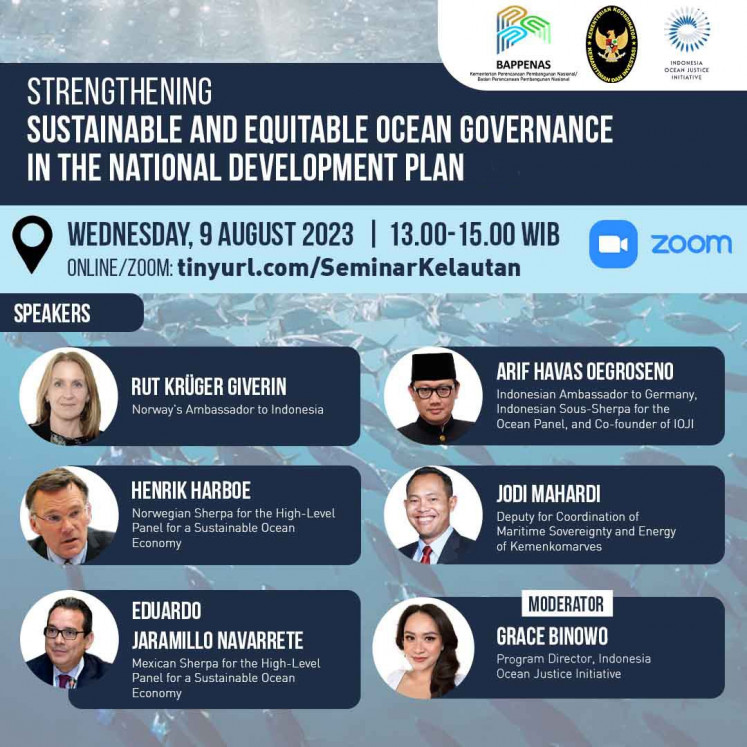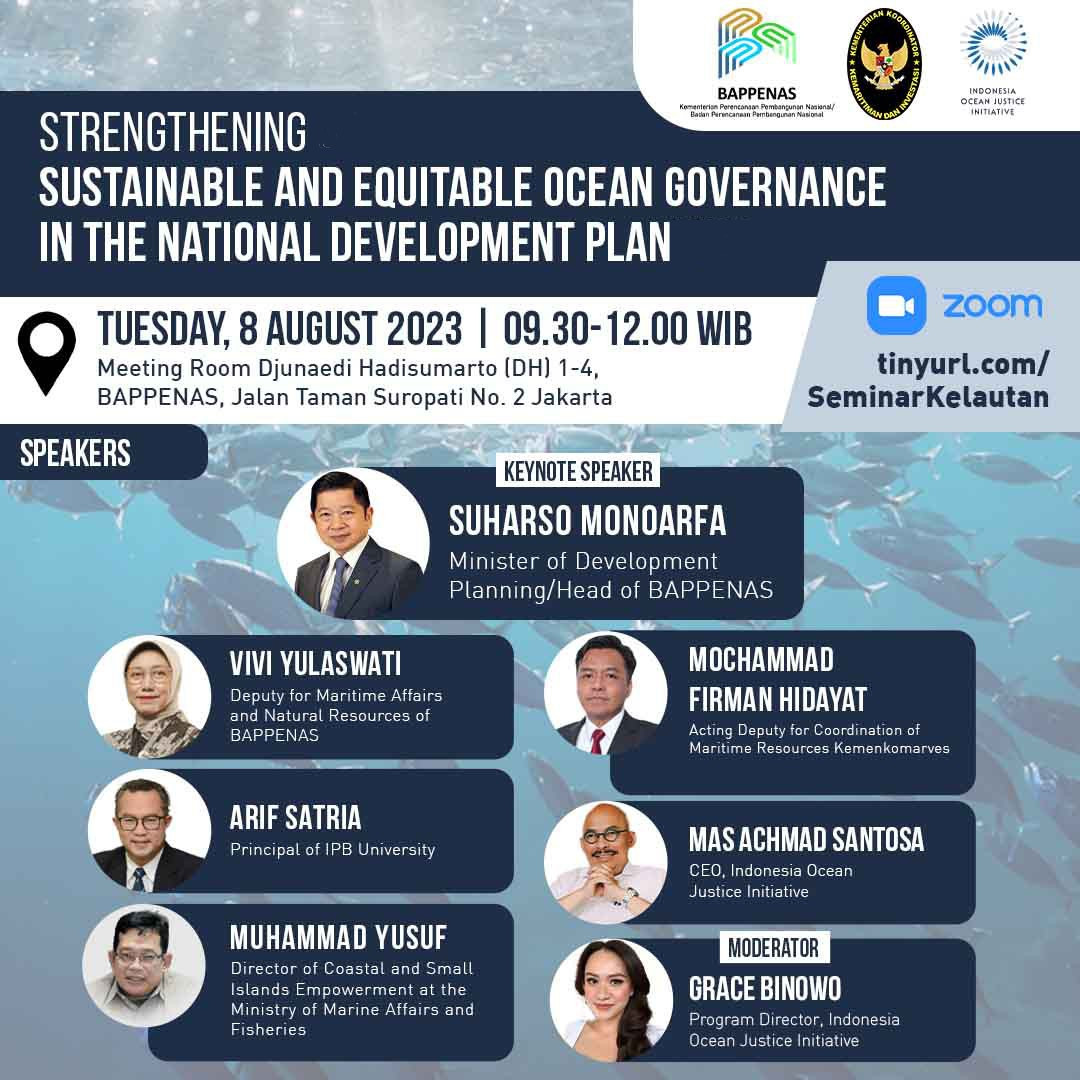Popular Reads
Top Results
Can't find what you're looking for?
View all search resultsPopular Reads
Top Results
Can't find what you're looking for?
View all search resultsBappenas, Kemenko Marves, IOJI collaborate for sustainable and equitable ocean governance
Change text size
Gift Premium Articles
to Anyone
O
n June 15 President Joko “Jokowi” Widodo launched the 2025-2045 National Long Term Development Plan (RPJPN) with the theme of "A Sovereign, Advanced and Sustainable Archipelago", delineating the global maritime agenda as part of the Golden Indonesia 2045 vision.
Manifesting Indonesia's vision to become a developed country and the world's maritime axis by 2045 is heavily influenced by the archipelago's ability to manage marine resources in an integrated, sustainable and equitable manner.
In this regard, the blue economy, also known as the sustainable ocean economy, will need to serve as a reference for the direction of marine and fishery policies, which together put forward three pillars: effective protection, sustainable production and equitable prosperity.
According to the Organization for Economic Co-operation and Development (OECD), Indonesia's marine economy more than tripled within a five-year period from 2008 to 2013, and is estimated to have contributed around US$256 billion in annual gross value added (GVA) in 2013, up from $73 billion in 2008. The marine economy contributed 5.1 percent of the total Indonesian employment in 2013.
Marine resources play an important role in the provision of high-value ecosystem services, hence efforts to strengthen the marine economy need to be accompanied by effective protection to ensure the sustainability of marine and fishery resources as well as fostering equitable prosperity for the people, especially coastal communities whose life and livelihoods depend on the ocean.
As part of the discussions surrounding Indonesia’s blue economy, the National Development Planning Ministry/Agency (Kementerian PPN/Bappenas), the Coordinating Ministry of Maritime Affairs and Investment (Kemenko Marves) and the Indonesia Ocean Justice Initiative (IOJI) will be holding a two-day seminar on Aug. 8 and 9 to solicit input and suggestions for sustainable and equitable marine economic development planning in Indonesia, including those that will be integrated into the RPJPN and RPJMN.
The first day, to be held in a hybrid format at the Bappenas building, will highlight the threats faced by Indonesia’s maritime and fisheries sector; the National Blue Agenda Actions Partnership (NBAAP); improving the welfare of ocean-dependent communities; and justice aspect in the blue economy.
Indonesia’s marine economy faces planetary crises borne from climate change, pollution and loss of biodiversity, which also threaten the global economy and to exacerbate poverty levels.
Based on the World Bank’s climate risk profile, Indonesia is ranked in the top third of countries in terms of climate risk, citing the archipelago’s vulnerability to rising sea levels.
In addition, increasing frequency of extreme weather and loss of marine biodiversity can affect the rights of access and utilization of marine resources for coastal communities dependent on marine resources. Without well-planned adaptation and disaster risk-reduction efforts, the poorest and most marginalized communities will experience the greatest losses from the impacts of climate change.

Meanwhile, the seminar on the second day will be held entirely online via Zoom, spotlighting the role of the High Level Panel for Sustainable Ocean Economy (the Ocean Panel) in the 2030 agenda, testimonies from Mexico on the country’s drafting of the National Sustainable Ocean Plan, as well as the Presidential Regulation and the opportunities and gaps analysis in regard to the Indonesian Maritime Policy.
The Ocean Panel has launched an agenda to develop a sustainable ocean economy with a commitment to sustainably manage 100 percent of the sea area under national jurisdiction with sustainable ocean plans by 2025.
As a basis for a sustainable ocean economy, there are five mapped transformation areas, namely Ocean Wealth, Ocean Health, Ocean Equity, Ocean Knowledge and Ocean Finance, which will need to be integrated into the national development planning documents.
In addition to sustainable aspects, marine economic development must also keep in mind the aspect of justice, as the concept of a blue economy that is defined too narrowly can sacrifice the interests of marginalized communities who depend on marine resources for their survival.
To that end, Presidential Regulation No. 16/2017 on Indonesian Ocean Policy and Presidential Regulation No. 34/2022 on the 2021-2025 Indonesian Ocean Policy Action Plan serve as modalities for implementing blue economy in Indonesia.
Sustainable and equitable ocean governance requires the cooperation of all stakeholders, including the government, the private sector, academia and non-governmental organizations, as well as the community to jointly develop solutions and realize the Golden Indonesia 2045 vision and its commitments at the global level.
This article was published in collaboration with IOJI, Ministry of National Development Planning/Bappenas, and Coordinating Ministry of Maritime Affairs and Investment











